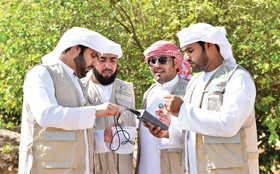While Abu Dhabi is mostly known for its desert, the environment here is so much more than that.
Abu Dhabi has one of the most unique and diverse natural geographies in the world, including everything from majestic mountains to rocky wadis and grassy oases.
It is also home to the world’s only complete coastal salt flat (sabkha) and our vast mangroves are key to the thriving biodiversity that brings life to our surroundings.
The emirate is home to hundreds of species – including 402 plants, 49 mammals, 382 birds, 67 amphibians and reptiles, three freshwater fish, the world’s second-largest population of dugongs and the world’s largest population of Indian Ocean Humpback Dolphins.
These species are well protected under our Sheikh Zayed Protected Areas Network.
We’re also making new discoveries all the time. The Spider Hunting Wasp was recorded at Al Wathba Wetland Reserve, and we’ve had rare sightings of the Indian Crested Porcupine, the Rüppell’s Fox and the Arabian Sand Cat.
As part of our mandate, we ensure effective and evidence-based planning and regulation for Abu Dhabi’s biodiversity.
Highlights
- • We led the world’s most ambitious mammalian species reintroduction programme by releasing Scimitar-horned Oryx, previously extinct in the wild, back to their homeland in Chad.
- • The Sheikh Zayed Protected Areas Network is made up of 19 terrestrial and marine protected areas that we continue to manage.
- • We successfully recorded 100 invertebrate species previously unknown in the Emirate and discovered nine insect species that are new to science.
- • We expanded our understanding of the emirate’s fish stocks through our Sustainable Fisheries Programme with the Ministry of Climate Change and Environment and published the UAE National Framework for Sustainable Fisheries 2019 – 2030.
- • For the first time in 35 years, we captured the Arabian Caracal on our remote sensing camera in Jabal Hafit National Park in Al Ain.
- • We tracked and tagged over 80 birds including the Greater Flamingo using our globally recognised satellite-tracking programme.



